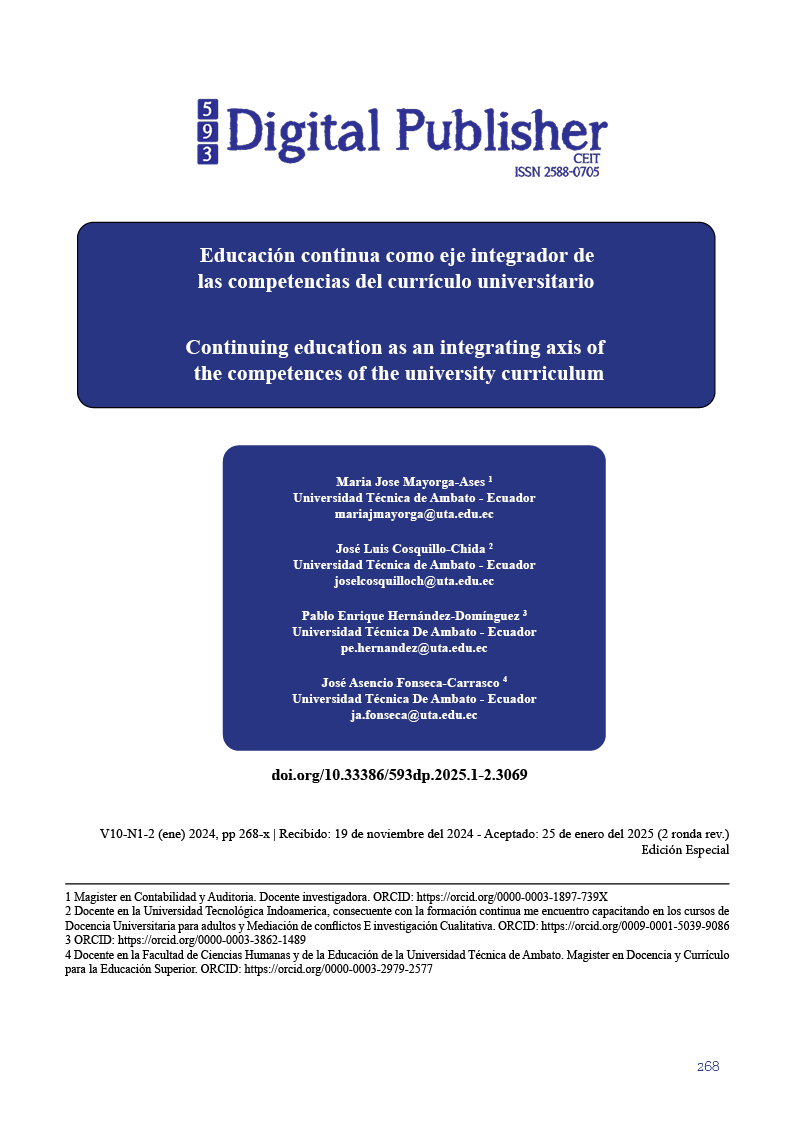Continuing education as an integrating axis of the competences of the university
Main Article Content
Abstract
Continuing education has become an essential component of university curricula, as it allows for the constant updating of knowledge and the development of transversal competences that complement formal academic training. The integration of continuing education into university curricula improves the employability of graduates by enabling them to keep abreast of developments and trends in their professional fields. Through participation in continuing education programmes, students and graduates develop key competences such as problem solving, innovation, leadership, project management and adaptability, which are essential in a constantly changing work environment. However, it is noted that participation in these programmes can be influenced by a number of factors, such as the availability of time, resources and the pedagogical approach of universities. Effective integration of continuing education into curricula requires proper planning and alignment of academic objectives with the needs of the labour market. In short, continuing education is a fundamental axis for the comprehensive training of students and the professional success of graduates.
Downloads
Article Details

This work is licensed under a Creative Commons Attribution-NonCommercial-ShareAlike 4.0 International License.
1. Derechos de autor
Las obras que se publican en 593 Digital Publisher CEIT están sujetas a los siguientes términos:
1.1. 593 Digital Publisher CEIT, conserva los derechos patrimoniales (copyright) de las obras publicadas, favorece y permite la reutilización de las mismas bajo la licencia Licencia Creative Commons 4.0 de Reconocimiento-NoComercial-CompartirIgual 4.0, por lo cual se pueden copiar, usar, difundir, transmitir y exponer públicamente, siempre que:
1.1.a. Se cite la autoría y fuente original de su publicación (revista, editorial, URL).
1.1.b. No se usen para fines comerciales u onerosos.
1.1.c. Se mencione la existencia y especificaciones de esta licencia de uso.
References
Alayande, B. T., Forbes, C., Kingpriest, P., Adejumo, A., Williams, W., Wina, F., Agbo, C. A., Omolabake, B., Bekele, A., Ismaila, B. O., Kerray, F., Sule, A., Abahuje, E., Robertson, J. M., Yule, S., Riviello, R., & Isichei, M. (2024). Non-technical skills training for Nigerian interprofessional surgical teams: a cross-sectional survey. BMC Medical Education, 24(1), 547. https://doi.org/10.1186/s12909-024-05550-8
Al-Omary, H., Soltani, A., Stewart, D., & Nazar, Z. (2024). Implementing learning into practice from continuous professional development activities: a scoping review of health professionals’ views and experiences. BMC Medical Education, 24(1), 1031. https://doi.org/10.1186/s12909-024-06016-7
Araújo-Neto, F. de C., Dosea, A. S., Tavares, T. M. A., Santos, D. de M., Mesquita, A. R., de Araújo, D. C. S. A., & de Lyra-Jr, D. P. (2024). “Opportunities and responsibilities”: how do pharmacists assess their professionalism? BMC Medical Education, 24(1), 831. https://doi.org/10.1186/s12909-024-05767-7
Ballaram, S., Perumal-Pillay, V., & Suleman, F. (2024). A scoping review of continuing education models and statutory requirements for pharmacists globally. BMC Medical Education, 24(1), 343. https://doi.org/10.1186/s12909-024-05322-4
Bensouda Korachi, I., Diouri, I., Bouaddi, O., Najdi, A., Obtel, M., Badou, A., Belyamani, L., Khalis, M., & Benjelloun, R. (2024). Prescription of psychotropic drugs by non-psychiatrist specialists in Morocco: current practices and educational needs. BMC Medical Education, 24(1), 958. https://doi.org/10.1186/s12909-024-05825-0
Bond, M., Khosravi, H., De Laat, M., Bergdahl, N., Negrea, V., Oxley, E., Pham, P., Chong, S. W., & Siemens, G. (2024). A meta systematic review of artificial intelligence in higher education: a call for increased ethics, collaboration, and rigour. International Journal of Educational Technology in Higher Education, 21(1), 4. https://doi.org/10.1186/s41239-023-00436-z
Castellanos, D., & Eno, C. (2024). Not From Around Here: Evaluation of In-Person Interviews in an Urban General Surgery Residency Program. Journal of Surgical Education, 81(12), 103283. https://doi.org/10.1016/j.jsurg.2024.09.002
Coley, R. L., Carey, N., Hwang, D., Spielvogel, B., & Henry, D. (2024). Racial Inequities in Educational Opportunity: Variation Across Socioeconomic Status. Race and Social Problems, 16(4), 414–432. https://doi.org/10.1007/s12552-024-09415-z
Cross, A., Soper, A. K., Thomson, D., Putterman, C., McCauley, D., Micsinszki, S. K., Martens, R., Solomon, P., Carter, L., Reynolds, J. N., de Camargo, O. K., & Gorter, J. W. (2024). Development, implementation, and scalability of the Family Engagement in Research Course: a novel online course for family partners and researchers in neurodevelopmental disability and child health. Research Involvement and Engagement, 10(1), 80. https://doi.org/10.1186/s40900-024-00615-w
De Schepper, A., Kyndt, E., & Clycq, N. (2024). The Importance of Graduates’ Perceived Network Quality in Their Transition to Work: A Longitudinal Approach. European Journal of Education, 59(4), e12786. https://doi.org/10.1111/ejed.12786
Eisenberg, S., Walles, B., & Long, E. (2024). Theory in action for graduate nurse educator students: An experiential learning project. Nurse Education Today, 143, 106391. https://doi.org/10.1016/j.nedt.2024.106391
Hakvoort, L., Dikken, J., Dinh Xuan, L. T., van der Schaaf, M., & Schuurmans, M. (2025). Integrated measure for training transfer in nursing practice: Development and validation study. Nurse Education Today, 144, 106482. https://doi.org/10.1016/j.nedt.2024.106482
Heidebrecht, C., Fierheller, D., Martel, S., Andrews, A., Hollahan, A., Griffin, L., Meerai, S., Lock, R., Nabavian, H., D’Silva, C., Friedman, M., & Zenlea, I. (2024). Raising awareness of anti-fat stigma in healthcare through lived experience education: a continuing professional development pilot study. BMC Medical Education, 24(1), 64. https://doi.org/10.1186/s12909-023-04889-8
J., K., S.B., M., C., C., C., H., & K., S. (2025). Responding to the Growing Need for Medical Experts in Testamentary and Estate Related Capacities: A Course for Physicians. American Journal of Geriatric Psychiatry, 33(2), 169–175. https://doi.org/10.1016/j.jagp.2024.08.013
James-Gallaway, C., & Dixson, A. D. (2025). Blackademics as prophetic witnesses and the continuing struggle for racial justice in higher education. Race Ethnicity and Education, 28(1), 1–18. https://doi.org/10.1080/13613324.2024.2419137
Karam, P. E., Hamad, L., Elsherif, M., Kreidieh, K., Nakouzi, G., El Asmar, K., Kabakian-Khasholian, T., Curi, D. A., & Yazbek, S. N. (2024). Genetic literacy among primary care physicians in a resource-constrained setting. BMC Medical Education, 24(1), 140. https://doi.org/10.1186/s12909-024-05110-0
Ladden, M. D., Kelley, H. J., McBride, A. B., Fairman, J., & Hassmiller, S. (2025). Preparing the next generation of nurse leaders in education, science, and practice: Lessons from four Robert Wood Johnson Foundation programs. Nursing Outlook, 73(1), 102314. https://doi.org/10.1016/j.outlook.2024.102314
Lähdesmäki, S., Maunumäki, M., & Nurmi, T. (2024). Play is the Base! ECEC Leaders’ Views on the Development of Digital Pedagogy. Early Childhood Education Journal, 52(8), 1897–1910. https://doi.org/10.1007/s10643-023-01530-7
Lara Satán, A. A., Satán, N. L., Velastegui Hernández, R. S., & Pullas Tapia, P. S. (2020). Organization and management in the prevention of occupational psychosocial risks in urban public transport. Universidad y Sociedad, 12(4).
Li, S., Su, L., Lou, R., Liu, Y., Zhang, H., & Jiang, L. (2024). Blended teaching mode based on small private online course and case-based learning in analgesia and sedation education in China: a comparison with an offline mode. BMC Medical Education, 24(1), 28. https://doi.org/10.1186/s12909-023-04839-4
Li, X., Yang, L., Zhou, T., Liang, H., Zhang, L., Jiang, W., & Xie, N. (2024). Insights into virtual reality-based training for unexplained disease outbreaks: A qualitative exploration of Chinese standardized training nurses’ experiences. Nurse Education Today, 143, 106358. https://doi.org/10.1016/j.nedt.2024.106358
Martins, P. C., Tinoca, L., & Alves, M. G. (2024). On the effects of Erasmus+ KA 1 mobilities for continuing professional development in teachers’ biographies: A qualitative research approach with teachers in Portugal. International Journal of Educational Research Open, 7, 100368. https://doi.org/10.1016/j.ijedro.2024.100368
More, T., Goldberg, F., Basir, M., Maier, S., & Price, E. (2024). From implementation to reflection: exploring faculty experiences in a curriculum-focused FOLC through multi-case analysis. Disciplinary and Interdisciplinary Science Education Research, 6(1), 7. https://doi.org/10.1186/s43031-024-00097-6
Mukamana, A., Byungura, J. C., Manirakiza, F., & Rushingabigwi, G. (2024). Knowledge, usability and challenges of e-learning platforms for continuing Professional Development of healthcare professionals at University Teaching Hospital of Kigali. BMC Medical Education, 24(1), 613. https://doi.org/10.1186/s12909-024-05585-x
Nguyen, D., Tupas, K. D., & Thammasitboon, S. (2024). Evolution of a Continuing Professional Development Program Based on a Community of Practice Model for Health Care Professionals in Resource-Limited Settings. Journal of Continuing Education in the Health Professions, 44(1), 58–63. https://doi.org/10.1097/CEH.0000000000000505
Ntessalen, M., Krasniqi, A., & Murchie, P. (2024). Development and piloting of an online course to improve knowledge, confidence and attitudes towards triaging images of skin lesions submitted online in primary care. BMC Medical Education, 24(1), 839. https://doi.org/10.1186/s12909-024-05840-1
Nyiringango, G., Fors, U., Forsberg, E., & Tumusiime, D. K. (2024). Enhancing clinical reasoning for management of non-communicable diseases: virtual patient cases as a learning strategy for nurses in primary healthcare centers: a pre-post study design. BMC Medical Education, 24(1), 441. https://doi.org/10.1186/s12909-024-05440-z
Páez, D. C., Flórez, J., Gómez, M. T., García, D., Arango-Paternina, C. M., & Duperly, J. (2024). Curricular and pedagogical approaches for physical activity prescription training: a mixed-methods study of the “Exercise is Medicine” workshops in Colombia. BMC Medical Education, 24(1), 79. https://doi.org/10.1186/s12909-023-04999-3
Poizat, G., Drakos, A., Ambrosetti, É., Flandin, S., Ria, L., & Leblanc, S. (2024). Enactive Design-Based Research in Vocational and Continuing Education and Training. Vocations and Learning, 17(3), 537–563. https://doi.org/10.1007/s12186-024-09348-z
Shen, B., Chen, Y., Wu, Y., Lan, Y., He, X., Wang, N., Liu, J., & Yu, Y. (2024). Development and effectiveness of a BOPPPS teaching model-based workshop for community pharmacists training. BMC Medical Education, 24(1), 293. https://doi.org/10.1186/s12909-024-05282-9
Shitrit, I. Ben, Shmueli, M., Ilan, K., Karni, O., Hasidim, A. A., Banar, M. T., Goldstein, Y., Wacht, O., & Fuchs, L. (2024). Continuing professional development for primary care physicians: a pre-post study on lung point-of-care ultrasound curriculum. BMC Medical Education, 24(1), 983. https://doi.org/10.1186/s12909-024-05985-z
Taborda, J. C. M., Guzmán, J. C. M., & Higuita-Gutiérrez, L. F. (2024). Understanding antibiotic knowledge, attitudes, and practices: a cross-sectional study in physicians from a Colombian region, 2023. BMC Medical Education, 24(1), 380. https://doi.org/10.1186/s12909-024-05354-w
Thai, T. K., Board, C. A., Nugent, J. R., Johnston, J. L., Huynh, E. Y., Chen, C. H., Chan, A. H., Grant, R. W., Gilliam, L. K., & Gopalan, A. (2025). Overcoming therapeutic inertia in newly diagnosed type 2 diabetes: Protocol of a randomized, quality improvement trial. Contemporary Clinical Trials, 148, 107751. https://doi.org/10.1016/j.cct.2024.107751
Vakani, F. S., Demirkol, A., Uebel, K., & Balasooriya, C. (2024). CME providers’ experiences and practices in Pakistan: a case study. BMC Medical Education, 24(1), 272. https://doi.org/10.1186/s12909-024-05201-y
Vakani, F. S., Uebel, K., Balasooriya, C., & Demirkol, A. (2024). The Status Quo of Continuing Medical Education in South-East Asia and Eastern Mediterranean Regions: A Scoping Review of 33 Countries. Journal of Continuing Education in the Health Professions, 44(1), 44–52. https://doi.org/10.1097/CEH.0000000000000471
Velastegui, R., Poler, R., & Díaz-Madroñero, M. (2023). Aplicación de algoritmos de aprendizaje automático a sistemas robóticos multiagente para la programación y control de operaciones productivas y logísticas: una revisión de la literatura reciente. Dirección y Organización, 0(80), 60–70. https://doi.org/10.37610/DYO.V0I80.643
Velastegui, R., Poler, R., & Díaz-Madroñero, M. (2025). Revolutionising industrial operations: The synergy of multiagent robotic systems and blockchain technology in operations planning and control. Expert Systems with Applications, 269, 126460. https://doi.org/10.1016/J.ESWA.2025.126460
Whittem, V., Meehan, M. T., Roetzel, A., Nakai Kidd, A., Sadick, A. M., Raphael, J., & O’Mara, J. (2024). Bridging the gaps – A mixed methods approach to evaluating novel feedback surveys of children on school buildings. Building and Environment, 266, 112067. https://doi.org/10.1016/j.buildenv.2024.112067
Yanagita, Y., Yokokawa, D., Fukuzawa, F., Uchida, S., Uehara, T., & Ikusaka, M. (2024). Expert assessment of ChatGPT’s ability to generate illness scripts: an evaluative study. BMC Medical Education, 24(1), 536. https://doi.org/10.1186/s12909-024-05534-8





